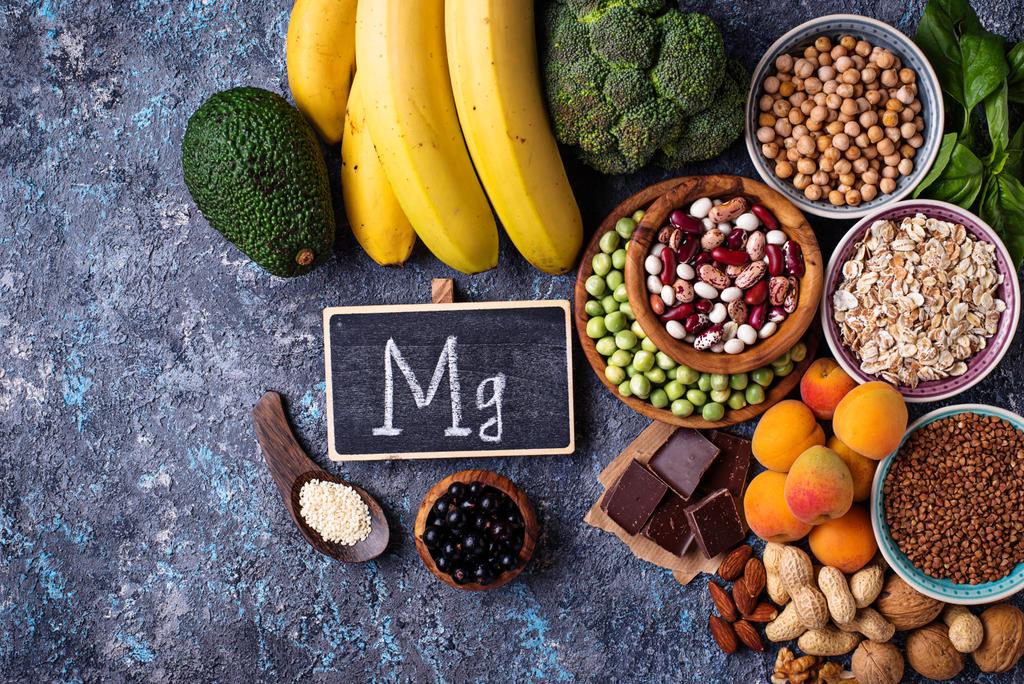Discover the fascinating connection between magnesium and metabolism.
How Does Magnesium Affect Metabolism?
Magnesium is often hailed as a wonder mineral when it comes to our health. But have you ever wondered how it affects our metabolism? Well, wonder no more! In this article, we’ll dive deep into the world of magnesium and its intricate relationship with our body’s energy processes. So grab a cup of tea and let’s get started!

Understanding the Role of Magnesium in the Body
Magnesium plays a crucial role in numerous biological functions. It’s like the silent superhero, working tirelessly behind the scenes to keep our body running smoothly. From regulating muscle and nerve function to maintaining a healthy heartbeat, magnesium does it all.
One of its primary responsibilities is supporting the body’s metabolic processes. Think of magnesium as the conductor of a symphony orchestra, ensuring that every step in the metabolic dance is harmonious and efficient.
But let’s dive deeper into the biological importance of magnesium. It acts as a co-factor for over 300 enzyme systems responsible for various metabolic reactions. These enzymes are the catalysts that drive chemical reactions in our body, turning food into energy and helping us maintain optimal health.
Furthermore, magnesium supports DNA synthesis, protein production, and glucose metabolism. It’s like a nutritional multitasker, wearing many hats to keep our body firing on all cylinders.
Now, let’s explore how magnesium impacts cellular function. Our cells are the building blocks of life, and magnesium ensures they are happy and healthy. It helps maintain cellular function by regulating the flow of ions into and out of cells, ensuring a delicate balance that allows all systems to operate smoothly.
Moreover, magnesium is involved in the production and transport of ATP (adenosine triphosphate), the energy currency of our cells. In other words, magnesium is the fuel that powers our cellular engines, keeping us energized and ready to take on the world!
The Connection Between Magnesium and Metabolism
Now that we understand magnesium’s essential role in our body, let’s explore how it affects our metabolism, the chemical process that converts food into energy.
Magnesium is not just a passive bystander in our metabolic processes; it plays an active role in various aspects of energy production and protein synthesis.
Magnesium’s Role in Energy Production
Magnesium holds the key to unlocking the energy stored in the food we consume. It activates enzymes involved in breaking down carbohydrates, proteins, and fats, allowing the body to extract the energy-rich molecules within.
But magnesium’s role in energy production goes beyond simply facilitating the breakdown of macronutrients. It also influences the production and utilization of ATP (adenosine triphosphate), the primary energy currency of our cells. Magnesium is required for the synthesis of ATP, ensuring that our cells have a constant supply of energy to carry out their functions.
Additionally, magnesium has been found to influence insulin production and sensitivity, important factors in regulating blood sugar levels. By supporting efficient energy production and glucose metabolism, magnesium helps keep our metabolism firing on all cylinders.
Magnesium and Protein Synthesis
Proteins are the building blocks of life, and magnesium plays a vital role in their synthesis. It aids in the formation of amino acids, the building blocks of proteins, and supports the processes that stitch these amino acids together.
Without magnesium, our body’s protein synthesis machinery would come to a grinding halt, disrupting vital processes in our metabolism. This means that a sufficient supply of magnesium is necessary to ensure our body can build and repair tissues, from muscles to organs to enzymes.
In addition to its role in protein synthesis, magnesium also acts as a cofactor for numerous enzymes involved in various metabolic pathways. These enzymes are responsible for catalyzing reactions that are essential for the metabolism of carbohydrates, lipids, and amino acids.
Furthermore, magnesium is involved in the regulation of DNA and RNA synthesis, which are crucial processes for cell growth and division. It helps maintain the integrity of our genetic material and ensures that our cells can replicate and function properly.
Overall, magnesium’s involvement in energy production and protein synthesis highlights its importance in maintaining a healthy metabolism. By ensuring optimal energy production and supporting the synthesis of essential molecules, magnesium keeps our body functioning at its best.
The Impact of Magnesium Deficiency on Metabolism
Unfortunately, magnesium deficiency is more common than we might think. So what happens when our body lacks this superhero mineral? Let’s find out!
Magnesium, often referred to as the “mighty mineral,” plays a crucial role in our body’s overall function. It is involved in over 300 biochemical reactions, making it essential for various physiological processes.
Symptoms of Magnesium Deficiency
A magnesium deficiency can manifest in various ways, making it challenging to identify. Symptoms range from mild to severe and can include muscle cramps, fatigue, irregular heartbeat, and even mood disturbances.
However, it’s important to note that these symptoms can also be attributed to other health conditions. If you suspect a magnesium deficiency, it’s best to consult with a healthcare professional for proper diagnosis and guidance.
Long-term Effects of Low Magnesium Levels
Long-term magnesium deficiency can have a profound impact on our metabolism. It can hinder energy production, impair insulin sensitivity, and disrupt the synthesis of important molecules in the body.
Furthermore, magnesium deficiency has been linked to an increased risk of developing chronic conditions such as type 2 diabetes, cardiovascular disease, and osteoporosis. Studies have shown that individuals with low magnesium levels are more prone to insulin resistance, which is a precursor to diabetes.
In addition to its role in energy production and insulin sensitivity, magnesium is also essential for maintaining a healthy cardiovascular system. It helps regulate blood pressure, supports proper heart rhythm, and reduces the risk of heart disease.
Moreover, magnesium deficiency can negatively impact bone health. It is a key component of bone structure and is necessary for the absorption and metabolism of calcium. Without adequate magnesium levels, the risk of developing osteoporosis, a condition characterized by weak and brittle bones, increases.
So you see, ensuring adequate magnesium levels is essential for maintaining a healthy metabolism and overall well-being. Incorporating magnesium-rich foods such as leafy greens, nuts, seeds, and whole grains into your diet can help prevent deficiency and support optimal health.
How to Maintain Adequate Magnesium Levels
Now that we understand the importance of magnesium in our metabolism, let’s explore some ways to keep those levels in check.
Magnesium, often referred to as the “superhero mineral,” plays a crucial role in our overall health. It is involved in over 300 biochemical reactions in the body, including energy production, DNA synthesis, muscle function, and nerve transmission. Without adequate magnesium levels, our bodies may experience various symptoms such as muscle cramps, fatigue, and even heart arrhythmias.
So, how can we ensure that we maintain adequate magnesium levels? Let’s dive into some strategies that can help.
Dietary Sources of Magnesium
Fortunately, magnesium can be obtained from various dietary sources. Foods such as leafy green vegetables (hello, spinach!), legumes, nuts, seeds, and whole grains are excellent sources of this superhero mineral.
Leafy green vegetables, such as spinach, kale, and Swiss chard, not only provide a good amount of magnesium but also offer a plethora of other essential nutrients. These nutrient powerhouses are packed with vitamins, minerals, and antioxidants that support overall health and well-being.
Legumes, including beans, lentils, and chickpeas, are not only a great source of plant-based protein but also contain a significant amount of magnesium. Incorporating legumes into your diet can help boost magnesium levels while providing other health benefits such as improved digestion and reduced risk of chronic diseases.
Nuts and seeds, such as almonds, cashews, pumpkin seeds, and flaxseeds, are not only delicious but also rich in magnesium. These crunchy snacks can be enjoyed on their own or added to various dishes, such as salads, smoothies, or homemade granola.
Whole grains, such as brown rice, quinoa, and oats, are not only a great source of dietary fiber but also contain magnesium. Choosing whole grain options over refined grains can help ensure that you’re getting the maximum nutritional benefits, including magnesium.
So, next time you’re at the grocery store, be sure to stock up on these magnesium-rich foods to support your metabolism and overall health.
Magnesium Supplements: Pros and Cons
If you’re struggling to meet your magnesium requirements through diet alone, supplements can be an option. However, it’s always best to consult with a healthcare professional before adding any new supplements to your routine.
Magnesium supplements come in various forms, such as magnesium citrate, magnesium glycinate, and magnesium oxide. Each form has different absorption rates and bioavailability, so it’s important to choose the one that suits your needs best.
While supplements can help fill the magnesium gap, it’s important to remember that they are not a substitute for a healthy diet. Whole foods contain a symphony of nutrients that work together in harmony, something that supplements simply can’t replicate.
In addition, excessive magnesium supplementation can lead to adverse effects, such as diarrhea, nausea, and abdominal cramps. Therefore, it’s crucial to follow the recommended dosage and consult with a healthcare professional to ensure that you’re taking the right amount for your individual needs.
Furthermore, it’s worth noting that certain medications, such as antibiotics and diuretics, can interfere with magnesium absorption. If you’re taking any medications, it’s essential to discuss potential interactions with your healthcare provider before starting magnesium supplementation.
In conclusion, while supplements can be a helpful tool in maintaining adequate magnesium levels, they should be used as a complement to a balanced diet rather than a replacement.
By incorporating magnesium-rich foods into your meals and snacks and considering supplements when necessary, you can ensure that your body receives the magnesium it needs to function optimally.
The Interplay Between Magnesium and Other Nutrients
Magnesium doesn’t work alone. It dances in harmony with other nutrients, forming partnerships vital for maintaining a well-functioning metabolism.

Magnesium and Calcium: A Delicate Balance
Magnesium and calcium have a complex relationship, with each mineral relying on the other to perform its duties effectively. Calcium helps muscles contract, while magnesium helps them relax. Without this delicate balance, our metabolism would be out of sync.
So, it’s important to ensure a healthy intake of both minerals to keep our metabolism, muscles, and bones strong and working together like a well-rehearsed symphony.
The Role of Vitamin D in Magnesium Absorption
Vitamin D, known as the sunshine vitamin, plays a collaborative role with magnesium in metabolism. It helps our body absorb and utilize magnesium effectively.
So, remember to catch some rays (safely, of course!) or consider incorporating vitamin D-rich foods like fatty fish, fortified dairy products, and egg yolks to optimize magnesium absorption and boost your metabolism.
And there you have it, a detailed exploration of how magnesium affects metabolism. From being an essential cellular conductor to fueling our metabolic engines, magnesium is truly a force to be reckoned with. So, next time you enjoy a handful of nuts or a steaming spinach salad, remember to thank magnesium for keeping your metabolism fired up and ready for action!







